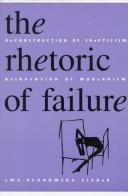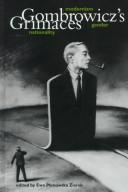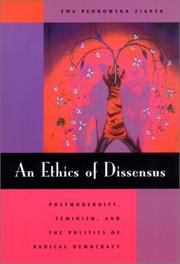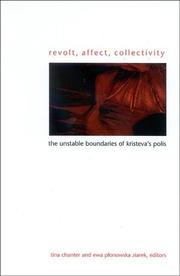| Listing 1 - 10 of 13 | << page >> |
Sort by
|

ISBN: 0791427129 Year: 1996 Volume: *6 Publisher: Albany State University of New York Press
Abstract | Keywords | Export | Availability | Bookmark
 Loading...
Loading...Choose an application
- Reference Manager
- EndNote
- RefWorks (Direct export to RefWorks)
Aesthetics, Modern --- Deconstruction. --- Ethics, Modern --- Skepticism. --- Deconstructie --- Deconstruction --- Déconstruction --- Filosofie van het postmodernisme --- Ongeloof --- Philosophie postmoderniste --- Postmodernism --- Postmodernisme --- Postmodernisme (esthétique) --- Postmodernisme (filosofie) --- Postmodernisme (philosophie) --- Scepticism --- Scepticisme --- Skepticism --- Unbelief --- Ethics [Modern ] --- 20th century --- Aesthetics [Modern ] --- Post-modernism --- Postmodernism (Philosophy) --- Aesthetics --- History --- Agnosticism --- Belief and doubt --- Free thought --- Arts, Modern --- Avant-garde (Aesthetics) --- Modernism (Art) --- Philosophy, Modern --- Post-postmodernism --- Criticism --- Semiotics and literature

ISBN: 0585076553 9780585076553 0791427110 0791427129 9780791427118 9780791427125 1438424841 Year: 1996 Publisher: Albany State University of New York Press
Abstract | Keywords | Export | Availability | Bookmark
 Loading...
Loading...Choose an application
- Reference Manager
- EndNote
- RefWorks (Direct export to RefWorks)
Deconstruction. --- Postmodernism. --- Ethics, Modern --- Aesthetics, Modern --- Skepticism. --- Criticism --- Semiotics and literature --- Scepticism --- Unbelief --- Agnosticism --- Belief and doubt --- Free thought --- Aesthetics --- Post-modernism --- Postmodernism (Philosophy) --- Arts, Modern --- Avant-garde (Aesthetics) --- Modernism (Art) --- Philosophy, Modern --- Post-postmodernism --- History
Book
ISBN: 9780231161480 9780231161497 9780231530903 Year: 2012 Publisher: New York, NY
Abstract | Keywords | Export | Availability | Bookmark
 Loading...
Loading...Choose an application
- Reference Manager
- EndNote
- RefWorks (Direct export to RefWorks)
Aesthetics --- Feminist criticism --- Feminist theory --- Modernism (Aesthetics) --- 82 "18/19" --- 82:396 --- 82:396 Literatuur en feminisme --- Literatuur en feminisme --- 82 "18/19" Literatuur. Algemene literatuurwetenschap--Hedendaagse Tijd --- Literatuur. Algemene literatuurwetenschap--Hedendaagse Tijd --- Feminism --- Feminist philosophy --- Feminist sociology --- Theory of feminism --- Criticism --- Radio broadcasting Aesthetics --- Philosophy

ISBN: 0791436438 0791436446 Year: 1998 Publisher: Albany (N.Y.) : State university of New York press,
Abstract | Keywords | Export | Availability | Bookmark
 Loading...
Loading...Choose an application
- Reference Manager
- EndNote
- RefWorks (Direct export to RefWorks)

ISBN: 0804741034 Year: 2001 Publisher: Stanford (Calif.): Stanford university press
Abstract | Keywords | Export | Availability | Bookmark
 Loading...
Loading...Choose an application
- Reference Manager
- EndNote
- RefWorks (Direct export to RefWorks)
Democracy --- Ethics, Modern --- Feminist ethics --- Postmodernism --- Moral and ethical aspects

ISBN: 0791482642 1435601203 9781435601208 9780791482643 0791465675 9780791465677 0791465683 9780791465684 Year: 2005 Publisher: Albany State University of New York Press
Abstract | Keywords | Export | Availability | Bookmark
 Loading...
Loading...Choose an application
- Reference Manager
- EndNote
- RefWorks (Direct export to RefWorks)
These original essays explore how the concept of revolution permeates and unifies Julia Kristeva's body of work by tracing its trajectory from her early engagement with the Tel Quel group, through her preoccupation in the 1980s with abjection, melancholia, and love, to her latest work. Some of the leading voices in Kristeva scholarship examine her reevaluation of the concept of revolt in the context of the changing cultural and political conditions in the West; the questions of the stranger, race, and nation; her reflections on narrative, public spaces, and collectivity in the context of her engagement with Hannah Arendt's work; her development and refinement of the notions of abjection, melancholia, and narcissism in her ongoing interrogation of aesthetics; as well as her contribution to film theory. Focused primarily on Kristeva's newest work—much of it only recently translated into English—this book breaks new ground in Kristeva scholarship.
Kristeva, Julia, --- Krŭsteva, I︠U︡lii︠a︡, --- Joyaux, Julia, --- Kurisuteva, Juria, --- Кръстева, Юлия, --- קריסטבה, ג׳וליה, --- קריסטבה, יוליה, --- クリステヴァ ジュリア, --- Kristeva-Joyaux, Julia, --- Joyaux, Julia Kristeva-, --- 321.01 --- 321.01 Algemene staatsleer. Politieke filosofie. Staatsleer. Staatstheorie --- Algemene staatsleer. Politieke filosofie. Staatsleer. Staatstheorie --- Philosophy, French --- History and criticism. --- French philosophy
Book
ISBN: 1474444369 9781474444361 9781474444330 1474444342 9781474444347 1474444350 Year: 2022 Publisher: Edinburgh
Abstract | Keywords | Export | Availability | Bookmark
 Loading...
Loading...Choose an application
- Reference Manager
- EndNote
- RefWorks (Direct export to RefWorks)
Winner of the 14th Annual Symposium Book AwardReconsiders Arendt’s philosophy of natality in terms of biopolitical theory and feminism to defend women's reproductive choices and democratic pluralismRosalyn Diprose and Ewa Ziarek provide a reconfiguration of Hannah Arendt’s philosophy of natality from the perspective of biopolitical and feminist theory. They show that Arendt provides new ways of contesting biopolitical threats to human plurality and the way biopolitics, along with sexism, racism and political theology target women’s reproductive agency. They also extend Arendt’s account of collective political action to include consideration of political hospitality, responsibility and story-telling as ways of countering the harms of biopower.The book offers an insightful account of the political ontology of Hannah Arendt and forms new dialogues between her and major 20th- and 21st-century thinkers including Foucault, Agamben, Nancy, Kristeva, Esposito, Derrida, Levinas and Cavarero.Key FeaturesThe first book length study of Arendt’s philosophy of natality that engages both biopolitical and feminist theoriesTeases out the implications of Arendt’s work for the diagnosis and contestation of the biopolitics of reproduction, including its racist elementsExamines how Arendt’s philosophy of natality changes the meaning of political concepts including agency, freedom, power, community, democratic plurality, responsibility and political hospitality Engages with contemporary political issues, such as struggles for reproductive justice, to demonstrate biopolitics' continuing threat to democratic pluralismMobilises Arendt as a biopolitical theorist between Foucault and Agamben to take Foucauldian biopolitical analysis beyond its usual focus on medical sociology"
Biopolitics --- Human reproduction. --- Women's rights. --- Human physiology --- Reproduction --- Reproductive health --- Reproductive rights --- Political behavior --- Human behavior --- Political science --- Sociobiology --- Rights of women --- Women --- Women's rights --- Human rights --- Philosophy. --- Civil rights --- Law and legislation --- Legal status, laws, etc. --- Arendt, Hannah, --- Blücher, Hannah Arendt, --- Bluecher, Hannah Arendt, --- Ārento, Hanna, --- Arendt, H. --- Arendt, Khanna, --- ארנדט, חנה --- アーレント, ハンナ,
Book
ISBN: 9780739127360 Year: 2011 Publisher: Lanham, Md. Lexington books
Abstract | Keywords | Export | Availability | Bookmark
 Loading...
Loading...Choose an application
- Reference Manager
- EndNote
- RefWorks (Direct export to RefWorks)
Arts --- Philosophy --- Political science
Book
ISBN: 9780823229192 9780823229208 Year: 2008 Publisher: New York Fordham university press
Abstract | Keywords | Export | Availability | Bookmark
 Loading...
Loading...Choose an application
- Reference Manager
- EndNote
- RefWorks (Direct export to RefWorks)
Autonomy --- Civilization, Modern --- Geopolitics --- Humanities --- Humanities --- Humanities --- Social change --- Forecasting --- Forecasting --- Forecasting --- Philosophy --- Social aspects --- Forecasting
Book

ISBN: 9780823237289 Year: 2009 Publisher: New York, NY
Abstract | Keywords | Export | Availability | Bookmark
 Loading...
Loading...Choose an application
- Reference Manager
- EndNote
- RefWorks (Direct export to RefWorks)
| Listing 1 - 10 of 13 | << page >> |
Sort by
|

 Search
Search Feedback
Feedback About UniCat
About UniCat  Help
Help News
News